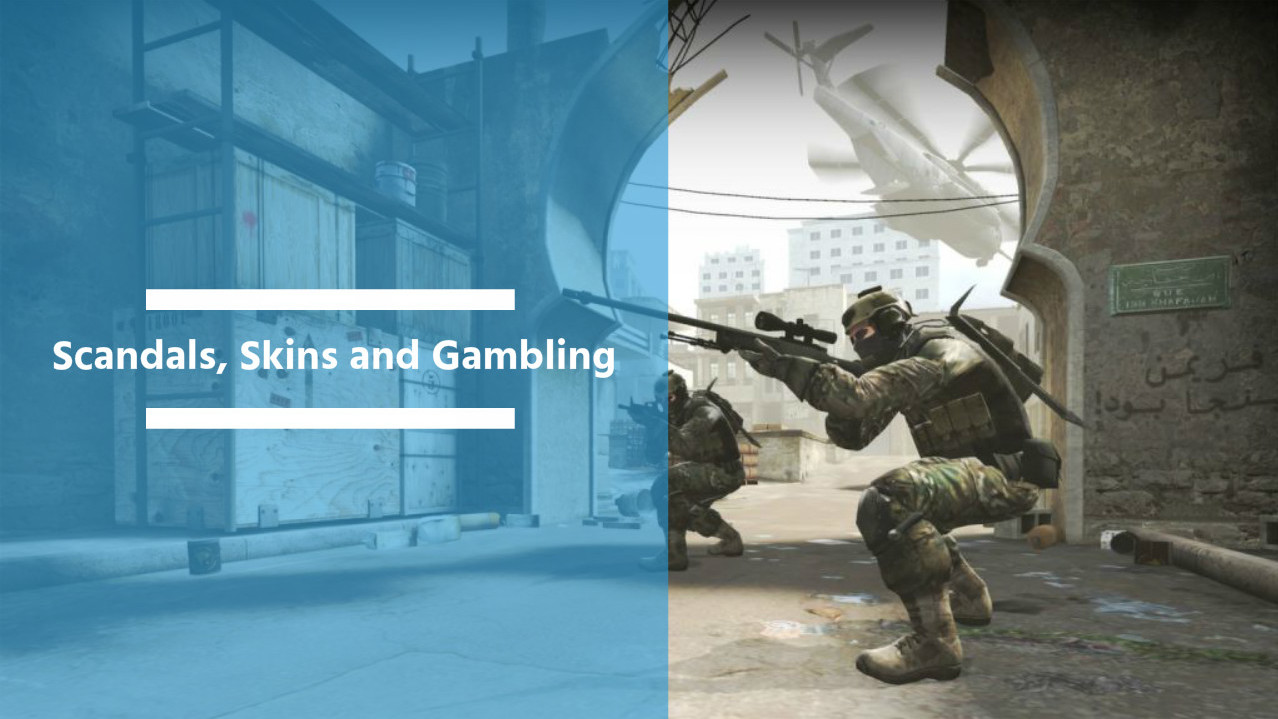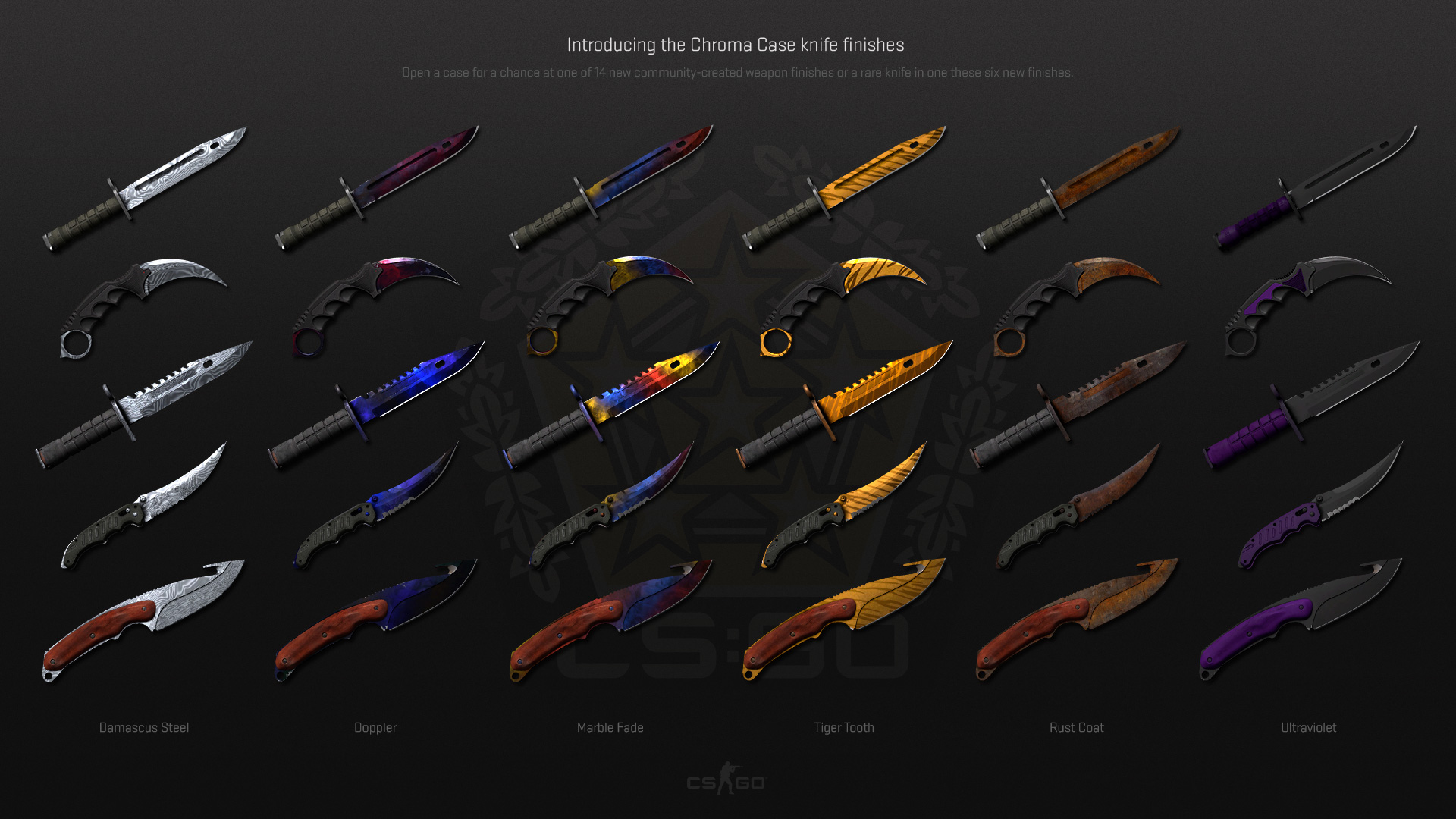Scandals, Skins and gambling on Counter-Strike
One of eSports biggest games gets embroiled in a new kind of betting scandal

Select the newsletters you’d like to receive. Then, add your email to sign up.
You are now subscribed
Your newsletter sign-up was successful
Want to add more newsletters?

Every Friday
Louder
Louder’s weekly newsletter is jam-packed with the team’s personal highlights from the last seven days, including features, breaking news, reviews and tons of juicy exclusives from the world of alternative music.

Every Friday
Classic Rock
The Classic Rock newsletter is an essential read for the discerning rock fan. Every week we bring you the news, reviews and the very best features and interviews from our extensive archive. Written by rock fans for rock fans.

Every Friday
Metal Hammer
For the last four decades Metal Hammer has been the world’s greatest metal magazine. Created by metalheads for metalheads, ‘Hammer takes you behind the scenes, closer to the action, and nearer to the bands that you love the most.

Every Friday
Prog
The Prog newsletter brings you the very best of Prog Magazine and our website, every Friday. We'll deliver you the very latest news from the Prog universe, informative features and archive material from Prog’s impressive vault.
The gaming world loves a scandal. It seems as though every few days, the community finds something new to collectively lose its shit about. Of course, even if there’s nothing happening, the games world is perfectly happy to make one up. The latest controversy is very real and it revolves around gambling on one of the most popular competitive first-person shooters, Counter-Strike: Global Offensive.
Firstly some background for the non-gamers. Counter-Strike: Global Offensive (or CSGO as it is know as in gaming shorthand) is made by Valve, the guys behind Steam, the PC’s biggest online platform (96 million users and growing). CSGO is one of the most high profile professional eSports (electronic sports i.e. playing games for money) games in the world. Like ‘proper’ sports, pro-players can win millions of dollars in the major tournaments.
Another unusual feature of the games world is that CSGO also has a vibrant community of content creators. Using the game’s modding tools, fans can build whole new levels for the game, or even new skins to personalise the game’s huge arsenal of weapons. These skins actually sell through the Steam service, with rarer ones fetching up to five figures. Yes, there are people who will drop $10,000 on a cosmetic change to your virtual (or ‘pretend’ for you non-gamers) weapon.
- Why I still hate Final Fantasy
- Devilish secret hidden in new Doom soundtrack
- 5 most metal game characters of all time
- Pokemon GO Crazy – 5 People Who Went Too Far For Pokemon Go
Here’s where the gambling comes in. Some enterprising folks have set up gambling sites that use CSGO weapon skins as currency. Some throw all of these weapon skins into a big pot with the lucky winner taking all (and the site skimming a percentage off the total of course). Other sites allow folks to gamble on the outcome of professional CSGO matches and tournaments. It’s big business. According to Bloomberg, the market for CSGO gambling is worth $2.3 billion.
This is where things get murky. Gambling on eSports in this manner is so far unregulated. Many regions restrict gambling to over 18s. Other don’t allow it at all. In the virtual spaces where these web sites operate, regulations and policing is sporadic, if it exists at all. More problematic is that many of these sites use a piece of code which allows them to link to user’s Steam accounts and distribute winnings automatically.
The code itself is perfectly ordinary. It’s available to all developers working on Steam and allows them to award prizes, distribute virtual content and do all of the fun things that modern games do to keep their players happy.
The fact you can then use it for what is effectively illegal gambling, is just one of the many delightful wrinkles in the rapid evolution of gaming. In a bid to make sure this doesn’t happen, Valve, the creator of Steam has made it against its terms of service - always a sure fire solution to illegal operations.
The latest news, features and interviews direct to your inbox, from the global home of alternative music.

In addition to allowing minors to gamble, allowing gambling in areas where it’s forbidden and most distressingly - violating Steam’s terms of service, there’s another problem - because the games sector never likes to just partially ruin things for itself.
However, it’s when you turn your attention to the murky world of pro-games teams, YouTubers and Twitch Streamers, who are some of the most high profile people in the gaming world, that the sudden huge growth in eSports, streaming channels and online gambling, that it all gets messy…
Several streamers and pro-gamers have been caught endorsing and promoting gambling sites, while absent mindedly forgetting to tell their thousands (and in some cases millions) of fans that they were being paid to do so.
Twitch streamer and YouTuber PhantomLord, whose streams have frequently seen him betting on gambling site CSGOWild (losing over $12,000 on a single bet at one point), has been banned from Twitch altogether for violating its terms of service. He’s since gone on record to imply that Valve was involved in his ban.
The same gambling site has been at the centre of its own controversy, when it emerged that members of the FaZe Clan pro-gaming team have been promoting the site, without mentioning they were being paid to do so. After initial news of the links emerged on YouTube, CSGOWild issued a statement saying it was all a bit of a misunderstanding and that it was perfectly straightforward sponsorship.
Other high-profile gamers have also been caught on the ‘dodgy end’ of gaming’s rapid evolution. Two popular YouTubers known as Trevor TmarTn Martin and Thomas ProSyndicate Cassell have been promoting the gambling site CSGOLotto without mentioning they actually founded the site.
Valve itself is now being dragged into the issue, with the company hit by a lawsuit alleging they “knowingly allowed an illegal online gambling market and has been complicit in creating, sustaining and facilitating that market”.
In response, the company has sent cease-and-desist letters to 23 different CSGO gambling sites, forcing several to close their doors and others to promise to change the way they operate.
While this can all be seen as bad behaviour and poor decisions, by inexperienced young scamps, rather than outright criminality, it does show just how quickly the whole concept of ‘gaming’ is evolving. There are YouTubers out there who command an audience of millions - and who are entirely independent and unregulated. The same is true for pro-gamers and ‘cyber athletes’, who are earning enormous sums from playing games. The economies of the biggest online games are now exceeding the GDP of some countries.
In such an environment, it’s only a matter of time before the bad guys show up. While the world’s press loses its mind over Pokemon Go, there’s an entire subculture out there which few people outside the games world are even aware of.
If you’re one of those people who still think games are something for kids and that they begin and end with consoles and games like Mario, Grand Theft Auto and Tomb Raider, the next ten years or so might be quite upsetting.
On the other hand, the good news is if your kids are smart, know their way around a few popular online games and have a little enterprise, working in video games may eventually be considered having a ‘real job’.
